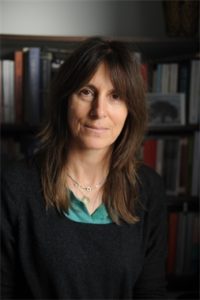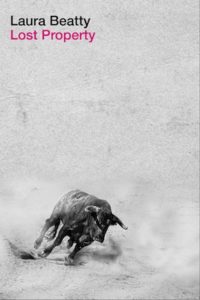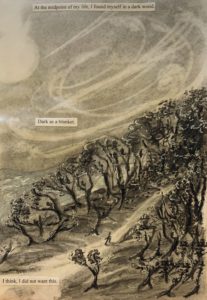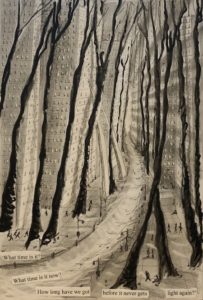New travels with myself and another
by Mika Provata-CarloneThe paradigm of the Commedia is deeply and organically embedded in Lost Property, and yet the shell-shock state Beatty describes, explores and anatomises is not different from the state of the Greeks and the Trojans after the fall of Troy. It is a parallel Beatty herself does not explore; the resonance however is poignant: only one of the returning heroes and warlords truly makes it home, retrieving and reconstructing the topos of nostos, belonging and existence beyond all trauma and doubt, genuinely purged from delusion and vainglory, from triumph and its monsters, and that is Odysseus, the man who roamed the earth and sea for ten long years getting to know the minds and cities of many men. Beatty’s unnamed female pilgrim is Odysseus-like in her sense of post-traumatic stress and shipwreckedness, in the agony of hearing her own voice in what looms as a historical and cultural wilderness – a wilderness, especially, of humanity. She determines to undertake her own land-bound Odyssey across Europe, braving the Scyllas and Charybdes of history, the Cyclopes of nationalism, and the Sirens and Circes of gross materialism and globalism, in search of an Ithaca of belonging and sense of self, bracing herself throughout for the possible void and nothingness she may well have to settle for if her quest fails, and Ithacas are no longer to be found. Along the way she will seek to confirm either a historical agnosticism, or a sense of personal and national identity. Perhaps even a more transcendental affinity to the divine: “‘Hello?’ into the darkness. ‘Hello? Is anybody there?’ And while I wait for an answer, I stand still… I SAID, WHAT DO YOU SUGGEST WE SHOULD DO? God has gone very quiet.”
“I thought writing was there to throw light on the way we are, so that the way we are could change. But the change hasn’t happened, or something else has taken over, because look, our dystopias seem to be coming true.”
Beatty traces the symptoms of the crisis with delicate humour and unwavering sharpness, intense fragility, intimacy, an inescapable, palpable immediacy. Her London scenes are haunting, terrifyingly familiar, an unsettlingly normalised part of our everyday lives. Fiction and reality in Lost Property become one seamless despairing humanity, and Dante’s Commedia, together with the long tradition of wanderlust narratives, of 19th century travel chronicles, and early 20th century memoirs of self-discovery through writing, become the metaphors of loss, retrieval and return, of the precarious balancing act between a feverish idealism and the most inky-black despair. They provide a borrowed vernacular of piercing insight and hope when contemporary narratives of meaning and coherence, of time and eternity, of human connectedness in a world madly intent on its own dissolution, seem to have failed both the author and her subject. “Is it my writing hand to blame? Because this [darkness] is a place I didn’t intend. I thought writing was there to throw light on the way we are, so that the way we are could change. But the change hasn’t happened, or something else has taken over, because look, our dystopias seem to be coming true, and now our eyes are too tired, or too dark with imagined disaster, to protest.”
Books, the written text, the world of fiction and the imagination, “offer connection between things that will always be separate and they allow, in fact they thrive on, difference. That used to be the point of books. They provided the parallel” that illuminated a path, offered a solution, a method of endurance and a narrative of hope, or, at least, of acceptance. In Lost Property even books, art and history have today become suspect and unreliable guides. Guides themselves seem to be nowhere in sight – there seems to be no Virgil, no hero, no luminous Beatrice, only Rupert, the heroine’s life companion, who runs “a small travel business. He takes people round archaeological sites. He is an expert on the ancient world –Greece and Rome in particular.” Rupert lacks, however “the obliterating gravitas of Virgil… I was hoping you could do something like Virgil does for Dante; slap me in the face with the nature of man, show me the heart of life.” Rupert is happy to oblige with the slapping, but not with the risk of being slapped back, so he will be a very different sort of chaperon and cicerone on this idiosyncratic, urgent, utterly beguiling and often harrowing Grand Tour. He will be a Hermes, a psychopomp, as she sees him, the leader of her soul as she descends into the Underworld of our current predicament and state of cluttered non-existence. He will also take photographs of everything they see – the modern equivalent of collecting relics, of taking back home the exotic possessions and belongings, the cultural and historical markers of the Other they seek to encounter, and perhaps appropriate.
Together they will set off in a dubiously suited caravan for a journey through France, Italy and the Balkans, with the ultimate goal of reaching a small island in Greece near the Ionian coast. They will leave Britain unencumbered by possessions, having dismantled a London flat and put their ‘belongings’ into storage and in a state of suspended existence that mirrors their own, as they search for the definition and possibility even of ‘belonging’ itself. “I look up ‘belonging’ and ‘belong’. The word has such emotional charge in English” – which it lacks, she says, in French, Spanish, Italian, German, Bosnian, Bulgarian and Greek, where two separate words “differentiate between possessions and people.” I belong, I long to be, is the theme that we hear throughout, and it is a formidable point of semantics and existential philosophy. A linguist would find much to quibble, however, with the rigour of the etymological argument concerning other languages: the Greek certainly has ‘ὑπάρχοντα’ (belongings) and ‘ὓπαρξη’ (existence).
Etymologies nonetheless become genealogies and foundation myths, incisions into our own human psyche and disorder; words emerge as the prisms of our perception, their origins conditioning and biasing, sustaining existence, chaos or harmony, belonging or division. The microfocus that the process of such analysis demands becomes an analogue for the process of retrieval of an Ur-text of original possibility and being. Words are their own palimpsests, as is history and as are nations. Beatty is particularly cautious about the latter. Nations are too chameleonic and fluid, too dependent on whim, fancy, the arbitrariness of far too many dark forces, organic (or culturally endemic) to our species, to merit conviction, at least not without a radical spiritual, intellectual and moral struggle, which she is keen to take on.
As readers, we are submitted to a similar process of unlearning, of mystification, in anticipation of what will emerge as a quiet, yet monumental epiphany at the journey’s end.”
Her stratagem is a ruthless process of alienation and defamiliarisation, a self-imposed exile not only from a country but also from a sense of individual centredness and understanding. It is a progression from detachment to a yearned-for belonging and attachment, echoing the type of foreign travel undertaken by Grand Tourists, and especially Locke’s injunction that in order to know, we must sense and be exposed to what is other than ourselves. As readers, we are submitted to a similar process of unlearning, of mystification, in anticipation of what will emerge as a quiet, yet monumental epiphany at the journey’s end. We are fated to follow Beatty’s lead without foreknowledge of her path: she picks out landmarks and historical figures with the flair of a highly specialised expert, and has the skill to thrill us and lure us into a page-turner through centuries, cultures, individual lives. In her hands, the known is revealed to be only the tip of an iceberg of wonder – or of terrible significance.
From that other wood, the Jungle – the immigrant compound in Calais that gives Beatty her secondary theme of movement and inertia, displacement and place, solidity and impermanence, refugees and indigenous claimants to a place and a time of humanity – the pair cross France summoning, among others, such companions as Eustace II, Count of Boulogne, a paradigm of neo-capitalism and venture economics who will haunt her throughout her journey, Auguste Mariette, an unlikely Egyptologist, Joan of Arc and Henry V, Nicolas Rolin, vicious persecutor of the Protestants, the utterly splendid Vix Krater, and Ranulf Higden and his Polychronicon, a cultural and historical 13th century Domesday Book, where the English are given a rather ruffian national portrayal. They believe that “everich other londe is hir owne”, they are, in Beatty’s summary of Higden’s long list of British ills, “snobbish and discontented and self-aggrandising… They boast and talk themselves up. They are gluttons. They are quarrelsome, murderous, dishonest… They are lecherous, argumentative, mercenary, envious and vain.”
In each case, it is a question of either/or, of identification through differentiation, of questioning hegemonies, political agendas, religious fanaticism, yet never ignoring the underlying frailty and need. Otherness creeps in, uninvited, or evoked through incantation. Pytheas and his Peri Tou Okeanou, where he gives us the first detailed account of Britain (or the Pretannia of Diodorus Siculus), Mistral and the Nacioun Gardiano, Beardsley dying in Menton. If England is the Dark Wood, France is certainly Inferno, resplendent in glorious history, rife with villains and sinners, circles and rings of decadence and human fallibility.
Italy is a limbo state, a riot of characters and modes, and here the question is no longer Britain vs. the continent, but rabid nationalism, the progress of humanity and the improvement of the soul. D’Annunzio is “the first monster we have met, which is surprising”, and the encounter is the first also to produce a heightened sense of Englishness. It is a crossing of paths that echoes the more darkly comical account given by Tamara de Lempicka in her diaries of her own stay at La Vittoriale. Christine de Pizan, vacillating between French and Italian, author of The Book of the City of Ladies, an imaginary realm populated only by real or fictive females, Elisabetta Gonzaga, the muse of Baldassare Castiglione, who wrote Il Cortegiano, the manual for the perfect English gentleman, and Isabella d’Este, the patron of Ariosto, as well as Ariosto himself, join a chorus of voices and ghosts at the deathbed of a carpione fish on the banks of Lake Garda. It is an ingenious, paradoxical, outrageous assembly, that will produce the climactic enunciation of Beatty’s sense of crisis: why do we not improve for all our civilising efforts?
Beatty displays a rigorous profundity that comes from a deceptively naïve, elemental approach to questions, responses, traumas and dilemmas. A conviction that we could (and should) go back to first principles.”
What follows, namely the Balkans, the Balkan conflict of recent years, the atrocities on every side and the narratives of expiation and revenge that become emblematic of humanity’s propensity for blindness and even hideousness, is a disputation on what makes us human or inhuman, worthy of living or oblivion. In the Dante paradigm, it is certainly worthy of the Seventh Circle of Hell. Rupert’s view is that we are “an imperfect species” and only “an accurate depiction of the world as it really is” is possible. To his companion’s disenchanted idealism, he offers pragmatism and realism, amorality, even though he is, in truth, “confusingly kind and ascetic”, a believer only in temperament. It is a question of nuances vs. absolutes, of exchanging material for celestial goods.
Throughout Lost Property, Beatty displays a rigorous profundity that comes from a deceptively naïve, elemental approach to questions, responses, traumas and dilemmas. A conviction that we could (and should) go back to first principles. She exercises a steely criticism of what she diagnoses as the “spiritual genocide” unleashed upon our world, our state of society and our state of mind, coupled with a sense of deeply wounded humanity. There are moments of utter desolation, even a sense of resigned nihilism: “I am looking at the water under the bridge, passing, trying its best to carry [the crimes of war] all away. Is it working? Because water is just time made manifest; and time is one of the kindest things we have.” The question of course is whether the kindness of time, of forgetting, of erasure, is enough; the question is how we achieve, how we regain, the kindness of people.
For Rupert at least, the answer would have to come from Greece, a traditional rhetorical formula in literature and philosophy to designate the alpha and the omega, the primordial wisdom and source. In the past two centuries, Greece as a real place and as a symbol had provided that originary moment and promise of a new beginning to just about everyone who thought and travelled. It was the locus amoenus one could visit in dreams or in fiction, but also the place where one could live a modern pastoral. Beatty certainly creates that expectation in Lost Property, following the vanishing shadow of Herodotus southwards and away from the Balkans: Greece, or at least its promise of an answer and of hope, is something she must hold on to, like Gilgamesh’s flower, “the point of the journey we have made.” If the reader’s expectations are for the Acropolis, Delphi, a Cycladic island or even Sarah Wheeler’s ‘Undiscovered Greek Island’ Evia, Beatty does not oblige (as for Evia, it had in fact been discovered before Wheeler by Virginia Woolf). From Kavala in the north, a ferry takes them to Lemnos, the exilic space of the poet Yiannis Ritsos, then to Chios and finally to Syros. The more classically minded will recognise the latter as the homeland of Odysseus’ swineherd Eumaeus, described vividly and at length in Homer’s Odyssey, a place where blessedness and tragedy fuse and intertwine.
Ritsos, dreamy and revolutionary, an anarchic aristocrat, gives her lyricism, naïve and rather nebulous communism, and Philoctetes an often overlooked revelation of the Iliad. The Greeks cannot win the war against the Trojans, but they also struggle to regain their own humanity because they have forsaken another fellow human being, the puss-oozing, snake-bitten outcast Philoctetes, whom they abandoned on the craggy island of Lemnos. Neither can we, is the unambiguous intimation. Chios and Syros have harrowing past histories of massacres and exodus to tell, as well as a present of refugee camps, of contemporary Philoctetes waiting for redemption. Another character (and he is both real and fictional) offers a “lesson in homesickness”, in the permanence of belonging, even in a postmodern, sceptical, adamantly theorising, ideological world: this Greek survivor of a Turkish massacre migrates to England, prospers, perhaps forgets; yet “something else was lost, a way of living, a place grown a certain way, bedded in its own particular customs and memories.”
It is a breaking point for Beatty’s long hesitation as to whether there is a distinction between nationalism and a sense of national belonging, between Eustacian egotism and a sense of self. After spending spring in Crete, there seems to be a way out of the darkness and into the stars, or at least a ferry back to mainland Greece and thence to England: “I am thinking of how to get rid of fear and quiet anxiety. That, I think, is our problem. Music and love are too fleeting. If we can’t change, then we need at least to belong to something bigger than just ourselves. So it’s unfashionable among liberals, but I’ve come back to nationhood. That’s a strong and unignorable thing, stronger than we like to allow.”
It has been a long and daring, centripetal/fugal quest for both a centre of gravity and for freedom of movement, and in the end the answer is critical attachment. It assumes that we accept the burden of history in order to claim the right to our humanity. That we waive the egotistical entitlement to be anything one wishes, or nothing and everything, in order to possess the right to be something that contributes, by acknowledging that we form part of that larger and multifarious whole. Another Greek who might have guided her to that “many distincts division none” point of arrival might have been Constantine Cavafy and his unique, extraordinary poetry. We are ourselves because we are a chapter, another perspective, to an essentially and vitally shared story of humanity and civilisation – our singularity is the triumph of our multiplicity.
Lost Property is a such a quiet triumph of the vital link between the single voice and polyphony. It is essentially an act of critical reading of our past, present and future, an act of thinking. It is an injunction to train our mind towards an enhanced sensibility, a discerning understanding of what things are worth thinking about. And from that perspective too, Beatty’s novel-essay is a reader’s and a critic’s delight – a provocative engagement in a contemplative, thoroughly enjoyable dialogue and meditation, even transcendence. “The search for nomads is a search for God”, Bruce Chatwin would write after a trip to Mount Athos, and for Beatty too, it seems that neither God nor man are so quiet or silent after all.
 Laura Beatty is the author of Pollard, which won the Authors’ Club First Novel Award and was shortlisted for the Ondaatje Prize. She has also written two biographies, the first about Lillie Langtry which contained the first publication of correspondence between Lillie and her lover Arthur Jones, and the second about Anne Boleyn. Lost Property is published by Atlantic Books in hardback and eBook.
Laura Beatty is the author of Pollard, which won the Authors’ Club First Novel Award and was shortlisted for the Ondaatje Prize. She has also written two biographies, the first about Lillie Langtry which contained the first publication of correspondence between Lillie and her lover Arthur Jones, and the second about Anne Boleyn. Lost Property is published by Atlantic Books in hardback and eBook.
Read more
@AtlanticBooks
Author portrait © Rupert Smith
Mika Provata-Carlone is an independent scholar, translator, editor and illustrator, and a contributing editor to Bookanista. She has a doctorate from Princeton University and lives and works in London.




